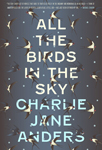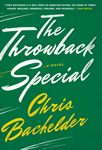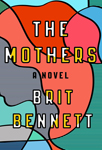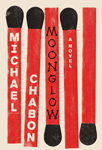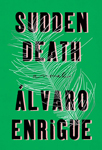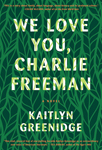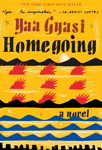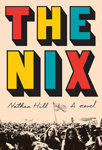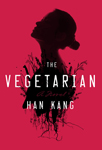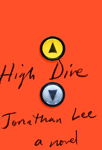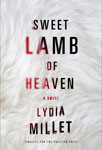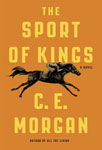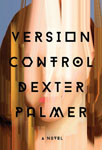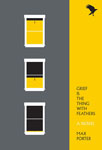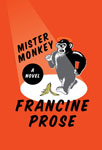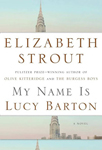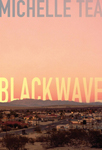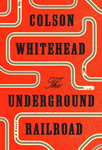by Charlie Jane Anders
Buy it at Powell’s »V.V. Ganeshananthan: As a college student, I studied with a teacher who wanted me to buy and to use a garden guide as part of my writing habit. The book she recommended was beautifully illustrated—a gorgeous object. I happily carried it around and turned to it in green spaces. It was the first time I had really tried to look at nature with a more attentive gaze, to name what I was seeing, and to understand my relationship to it. The memory of that experience is often with me, and I thought of it again as I read the two books assigned to me for the tournament: Han Kang’s The Vegetarian and Charlie Jane Anders’s All the Birds in the Sky.
That garden guide had made the world, a world I had thought I was already looking at, freshly unfamiliar and sharp and bright. Both Han and Anders achieve that same effect, writing about nature and space with a clarity that makes the world seem new again. I was surprised and pleased to find this thread between them, since they are very different books in tone and scope. The Han is literary fiction and the Anders is known as genre, but I have never cared much about those distinctions. To me their differences lay in their aims and structures: The Han goes deep into the consciousnesses of a few characters in limited, intensely rendered settings, and the Anders characterizes its sizable cast through a swiftly moving sequence of earth-shaking plot shifts and choices.
I began with the Han, which I had heard of, of course, but not yet read. The Vegetarian got a lot of attention in 2016: It won the Man Booker International Prize and also started conversations with its bleak depictions of violence against a woman suddenly determined, after a terrible dream, not to eat meat. The book is composed of three parts, from three different perspectives, none of which belong to the vegetarian herself. First, we see Yeong-hye through the eyes of her husband, Mr. Cheong, a man brutal in his judgments of both himself and her. Second, we watch her through the perspective of her artist brother-in-law, who glimpses in her the possibility of achieving his own dream. Finally, we are with her through the presence of her sister, who wonders at their different fates. The opening sentences of The Vegetarian (it is translated from the original Korean) are stunning:
Before my wife turned vegetarian, I’d always thought of her as completely unremarkable in every way. To be frank, the first time I met her I wasn’t even attracted to her. Middling height; bobbed hair neither long nor short; jaundiced, sickly-looking skin; somewhat prominent cheekbones; her timid, sallow aspect told me all I needed to know. As she came up to the table where I was waiting, I couldn’t help but notice her shoes—the plainest black shoes imaginable. And that walk of hers—neither fast nor slow, striding nor mincing.
This foreshadows one of the odd contradictions of the first section of The Vegetarian: The narrator states plainly that he finds his subject sometimes bland and generally inexplicable, and yet this is no impediment to my own interest. I found Yeong-hye remarkable. I wondered as I read how far one could go with inexplicability, and our exclusion from the vegetarian’s perspective. The first section is riveting in its depiction of the backlash Yeong-hye faces from her own family as they wrestle with her disobedience and unwillingness to eat as she has in the past. I felt sick as I read, and also couldn’t stop reading. In the second section, I felt a little more familiar with the character, as her reactions to her artist brother-in-law characterized her in interesting and unexpected ways. This kept my interest rising. (I’m leaving out a plot point here that I’d consider a spoiler.) I hoped that in the third section, still more would be revealed. Was this a fair expectation? I’m not sure, but despite some beautiful and precise descriptions of nature, the final section of The Vegetarian did not surprise me in the same way the first two did. Those displayed a sharpness that felt revelatory—and consistently named things I had wanted named without knowing it. I so admired those voices’ ability to jolt me without seeming at all implausible. I didn’t necessarily need to go into her perspective in the third section, but I craved more of Yeong-hye than I got. I finished the book struck by its beauty and unflinching prose, but I was also left wanting.
All the Birds in the Sky is, in a different way, as existential in its concerns. It shows the long arc of a friendship between a girl capable of magic (Patricia) and a boy gifted in science (Laurence). Patricia has been anointed a witch through an early encounter with a magical tree and the Parliament of Birds. Little Laurence, on the other hand, builds artificial intelligence in his bedroom closet and impresses grownup scientists with his two-second time machine.
This book is far plottier, venturing fearlessly, like the birds of the title, from perspective to perspective, and from world to world, knitting connections between them slowly and steadily. It is unafraid of darkness or beauty, and does a spectacular job of building and aging its two main characters over time. I turned the pages hungrily from the very beginning, unsure where things were going and yet building my faith in the author as each successive leap in time or space or character paid off. I was especially moved by the pathos of the early school scenes in which both Patricia and Laurence face bullies, and I was excited about the way some early asides suggested still other unseen worlds at this extraordinary world’s edge. (Imagine the library in your fantasy book has, on it shelf, another fantasy book. I’m a sucker for that glimpse through a cracked door.)
One of my favorite transitions in those early parts involves the kid duo at the mall together. They invent backstories for people based on shoes alone; Patricia guesses that a man in black slippers and worn gray socks is an assassin, “a member of a secret society of trained killers who stalked their prey, looking for the perfect moment to strike and kill undetected.” Then, although she doesn’t know it, she turns out to be right, and we’re vaulted briefly into the consciousness of troubled killer Theodolphus Rose, who has predictions about their futures and so wants to fell both of them. He can’t, because of a prohibition against killing children, so instead takes up a position as a guidance counselor at their school, where he attempts to turn them against each other. (One of those cracked doors: Rose’s Nameless Order of Assassins.)
Rose’s machinations set Patricia and Laurence’s dual and dueling fates in motion: As the world hurtles toward disaster, each has their own ideas about how to save it. The story disconnects and reconnects them; they struggle to trust each other, even as they understand each other better than anyone else. I couldn’t wait to see what happened as they weathered various paradigm shifts, from puberty to earthquakes to apocalyptic battles. Were they going to get out of their world-ending situation? Did this book even believe in getting out of things?
But that would be telling, and I think you should read both books. Since I have to pick, I advance All the Birds in the Sky. I was enlivened and excited by it even in its darkest moments (and it had them). This was a tough choice, but in the weeks that I read them, Anders’s book was the book that I needed and connected to more strongly; I was hungry for its propulsive energy in the face of disaster. Perhaps because, political situations being what they are, I wanted to know that I was in the hands of a writer who wouldn’t be falsely optimistic, but could still bring me joy.
Match Commentary
By Ashleigh Brantingham & D Lozano
Ashleigh Brantingham: Hello? Is this thing on? Great! As the sponsor of the Tournament of Books, we’ve had our own private commenting booth at Powell’s for years—I have no qualms about saying that Powell’s employees are some of the biggest ToB fans around—but this is the first time we’ve been invited to join the action firsthand. It’s nerve-racking over here!
D Lozano: My coworker, Dianah, champion campaigner for the tournament and a Powell’s bookselling go-to, got me started on this book bracket years ago, and now I’m deeply addicted. I’m sure we sell a book on how to overcome this sort of thing somewhere in the Self-Help section?
Ash: I bet I can find 12 by the time we’re done with this commentary. Speaking of commentary: What a round!
D: I have to admit I am shocked by the decision. But maybe it’s par for the course. It does seem to be the era of all my votes getting trumped. But shock and all, I did enjoy both books on very different levels.
Ash: I was also really surprised by Judge Ganeshananthan’s ruling, but I definitely went into this with preconceived notions. I’ve heard so much about The Vegetarian (it won the Booker Prize!) but the Tournament of Books is the first I’d heard of All the Birds in the Sky.
D: You’re onto something here that goes beyond just the hype around The Vegetarian. While I’d recommend All the Birds in the Sky to just about any reader who’s a fan of anything from X-Men to The Magicians to Three Dark Crowns, we’ve already seen so many variations on this theme. And it’s a good theme! It works. It’s enjoyable. It’s science meets magic. But we’ve been here before. And The Vegetarian is unlike anything I’ve ever read. It’s inexplicable. It’s beautiful. It dares you to figure it out. It’s an homage to language, to languages! It’s this good, and it’s in translation!
Ash: I secretly don’t read much fiction in translation because of Franz Kafka. I really like him, but there are multiple translations of the first line of The Metamorphosis, and each one lends itself to a different reading of that story. Now, whenever I learn that something has been translated, I get very overwhelmed with the possibility that I will miss out on some vital connotation that would unlock the novel’s One True Meaning. But The Vegetarian is such a strange story, and it already has so many interpretations, that I think it actually gained something from the translation. We are one step further from Yeong-hye than we would be had we read this in Korean; she’s even more distant and inscrutable. That was captivating to me.
D: Wow, that’s deep (and now the secret’s out!). And I agree. I’ve read a lot of literary fiction in translation, and this book seems to really defy what sometimes is a hangup for other books: culture. I didn’t need to understand South Korean culture, because the story came down to a universal feeling that all of us, on some level, have a dream of shedding society, violence, ourselves. This book is a meditation on what that dream looks like. But I admit a bias toward fiction in translation, which is why I’m just in the peanut gallery and not the judge.
Ash: If you ever leave Powell’s, we’ll erect a statue of you right in front of the Literary Criticism section.
D: I fully approve of me in figurine! But it’ll have to be a tiny statue so that if someone ever needs to perform magic in the store to pull you out of another dimension, say, Gaming Novels, when they ask for the smallest thing in the store, my statue will be able to save you from reading another Halo book.
Ash: That’s truly the darkest dimension.
I was really interested in this pairing of books, because on the surface they seem so different from one another. As Judge Ganeshananthan pointed out, The Vegetarian is literary fiction, and very strange literary fiction at that, while All the Birds in the Sky is genre—I assumed the decision would be determined by what the specific judge usually reads. I mean, that’s the beauty of the Tournament of Books! But I was surprised by how much the books had in common once I started reading them, most obviously nature or even women’s relationships with nature.
D: I might even go so far as to say that All the Birds in the Sky is a covert feminist manifesto that gives women everywhere the solution to ending mansplaining forever. The male protagonist (Laurence) has to honor the female protagonist’s (Patricia’s) identity or he can’t speak. Ever. Again.
Ash: All the Birds in the Sky did feel really of the moment: Every woman I know wants to be a witch. And I like how Patricia’s powers grow as the story goes on—when she’s a child, they’re very “Disney princess.” She talks to animals and has a magical tree guardian friend. And then she gets older, and suddenly she’s turning rapists into clouds!
D: Turning rapist into clouds. Yep. Wait, maybe I’ve changed my mind on this decision. The audacity to “invent” this ability, alone, could skyrocket this book into my all-time top five.
Ash: I definitely wanted to be Patricia more than I wanted to be Yeong-hye. All the Birds in the Sky struck me as high-concept wish fulfillment. Not that there’s anything wrong with that—I enjoyed reading it. When they inevitably make a movie out of it, I’ll go see it because the actors will all be hot and the graphics will be gorgeous. But The Vegetarian is going to stick with me for much longer.
D: For sure. Patricia is someone you’d love to be. Yeong-hye is more of a martyr for all of us. A font for all of the abuse and violence in the world, the disdain we suffer for being different. Yeong-hye takes it and rises above it, losing, in the process, what most of us hold more tightly to than anything else: our own survival.
Ash: And then there’s All the Birds in the Sky, which takes the survival of the human race very literally. The Vegetarian is hyper-focused on Yeong-hye’s experience, but as Judge Ganeshananthan says, All the Birds in the Sky “is far plottier, venturing fearlessly, like the birds of the title, from perspective to perspective, and from world to world, knitting connections between them slowly and steadily.” If The Vegetarian is concerned with one martyr’s soul, All the Birds in the Sky is concerned (as its title indicates!) with the survival of every being on this planet.
D: Both books really are all about some form of transcendence, but they look at it through very different lenses. One zooms out, one in. I can’t get over one of Ganeshananthan’s opinions because, from it, she and I draw diametrically opposing opinions. About The Vegetarian, she writes:
I didn’t necessarily need to go into her perspective in the third section, but I craved more of Yeong-hye than I got. I finished the book struck by its beauty and unflinching prose, but I was also left wanting.
But that’s the point! We are supposed to want more as Yeong-hye wants less and less. In the final section, we see the story through Yeong-hye’s sister, In-hye. She repeats, over and over, the phrase “time passes,” until soon there is no time left. In-hye measures the world in hours, minutes, seconds. Like so many of us do. But Yeong-hye dares to transcend that definition. She dares to shed humanity in search for more. She’s a Buddha. We have a Buddha versus hipsters saving the world. I’m gonna go with tortured human becomes Buddha every single time.
Ash: YES. I thought that the third section of The Vegetarian was perfect. It felt correct that we only ever saw Yeong-hye through other people’s eyes. I thought that the book would be about the repression caused by society, but it turned out to be about the repression caused by being human. There are some things you can’t escape, unless you’re willing to give up literally everything.
D: —and thereby becoming a Zombie and coming back and eating the competition alive! Although, can The Vegetarian actually devour the Rooster?
Kevin Guilfoile: Hi all! We just wanted to drop in to thank Ash and D for the wonderful job they did today, and to tell you about something fun we’re adding to our mix this year.
If you can’t quite face the prospect of a Roosterless weekend, Christopher Hermelin and Andrew Broussard of So Many Damn Books—you may remember that last year we called them the semi-official podcast of the ToB—have you covered. They will be providing a live video recap of the week’s judgments via Facebook Live on the ToB Facebook page—and fielding questions and comments from live viewers—every Saturday at 12 Eastern throughout the tournament. The action starts tomorrow on the ToB Facebook page. We understand there may be costumes.
John Warner: We’ll be back in the booth for Monday’s match between Elizabeth Strout’s My Name Is Lucy Barton and Dexter Palmer’s Version Control. That’s two matches with time travel back to back, a first in the history of the Rooster, probably. Novelist Steph Cha will be handing out the sentence. Have a great weekend, everybody, and enjoy Chris and Drew’s Facebook recap tomorrow.



